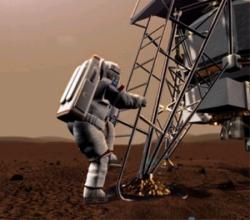Earthbound experiment to recreate stress of Mars mission
Earthbound experiment to recreate stress of Mars mission
 |
| Scientists hope that a 500-day isolation study in Russia will help them plan future flights to Mars (Illustration: ESA) |
Scientists are being asked to submit research proposals for a 500-day-long study simulating a human mission to Mars. The programme, a joint project between Russia and the European Space Agency, would be the longest simulation of its kind.
The 1.5-year Mars-500 simulation is designed to recreate some of the isolation and stresses that crew members might feel on an actual roundtrip to Mars, which would take about twice as long.
In late 2008 or early 2009, six people will enter a mock spacecraft in Russia consisting of a series of connected metal tanks. The 200-square-metre 'spacecraft' will include a medical area, a research area, a crew compartment and a kitchen.
The first leg of the experiment will last about 250 days and will simulate the journey to Mars. Then, part of the crew will enter a special Mars descent vehicle tank for 30 days to simulate a Mars landing. The entire crew will then make the return trip back to Earth.
The Russian Academy of Sciences' Institute of Biomedical Problems (IMBP) has already received more than 70 applications for the mission (see Volunteers line up for simulated mission to Mars).
Frozen food
ESA will get to choose two crew members for the project, although it has not yet finalised its criteria. ESA scientists plan to start the selection process in June 2007 and pick the participants and the science experiments in October.
During the 500-day study, the crew will try to live as a real crew headed to Mars might. At the beginning of the study, they will be given all the food they will ever get on the mission. That means they will largely subsist on frozen meals, though Russia might allow the crew to have a greenhouse to grow fresh produce.
Their day-to-day lives will be similar to crew members on the International Space Station, except for the presence of gravity. They will have cleaning, cooking, maintenance and scientific duties. They may even have press conferences with real reporters.
"The design will be such you start to forget it is a real simulation," says Marc Heppener, ESA's head of science and applications in the directorate of human spaceflight, microgravity and exploration. "People can be completely absorbed by games on the computer. You can go pretty far in a simulation."
Communications delays
To make it even more realistic, there will be a 20-minute communications delay between people in the spacecraft and "mission control" to simulate the time lag faced by spacecraft far from Earth.
The reactions of the "ground controllers" will also be studied. "Just imagine what would happen if you were on the phone and you hear on the other side, 'Help!' but you know this 'Help!' was uttered 20 minutes ago," Heppener told New Scientist. "And if you say, 'What can I do?' it will be another 20 minutes before they hear you. That's part of the psychology of this kind of study, and that's absolutely not trivial."
Scientists might be able to learn how the crew reacts to minor emergencies, such as a water line breaking. As on a real extended space mission, it is likely that at least one crew member will have medical training.
But if there is a real emergency during the simulation, "any person has the right to get out", Heppener says. "However, we want to make sure this only happens in real emergencies."
Bloody brawls
The extreme isolation and confinement of the simulation will lend important insights into how to design long-duration crewed space missions. "If I imagine myself where I really cannot see home, the planet where I live and where every other human being is, I can imagine that is quite significant," Heppener says.
Russia has conducted shorter simulations in the past and has seen firsthand the issues that arise, including sexual harassment. In an eight-month IMBP simulation in 2000, a Russian man twice tried to kiss a Canadian female researcher after two other Russians had gotten into a bloody brawl. As a result, locks were installed between the Russian and international crews' quarters (see Out-of-this-world sex could jeopardise missions).
The 500-day study will be preceded by one or two 100-day simulations to work out the early kinks. The first 100-day study could begin in early 2008.
In conjunction with the Russian study, ESA is also seeking proposals for the French and Italian Concordia research station in Antarctica in the hopes of running two parallel studies in two different isolated settings.
Kelly Young
New Scientist, April 3, 2007
http://www.newscientist.com/article/dn11529-earthbound-experiment-to-recreate-stress-of-mars-mission.html
|